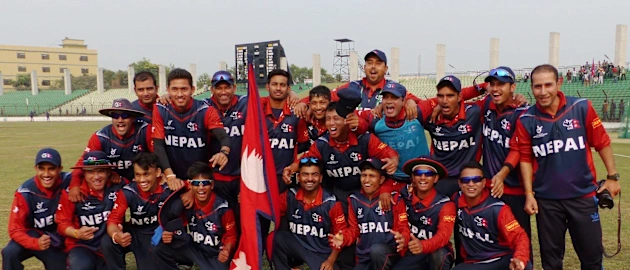Team Nepal: Rising along with the red sun of glory


Raato Ratandra Suryae,
Jangin Nishan Hamroz,
Judon Ragaz Sariyon,
Baldo Yosan Humro.
The Nepal cricket team’s victory song is quite infectious. Listen to it on YouTube and the lyrics grow on you with every passing stanza. The synchronised punch with which a flock of free-spirited boys give life to the words makes your hair stand on end and urges you to put it on loop.
Sudeep Sharma never had the honour of singing the victory song, as he could not represent Nepal in his 16-year career. When we ask him to explain the gist of the song to us, his face lights up.
Loosely translated to English, it means, “Red sun is the sign of our glory, and we are ready to do anything for our country; this country has a great legacy and history, we feel proud of that, and we will carry that forward in days to come.”
Sudeep got a chance to live his dream on Thursday (January 28) in his first assignment as manager of the Nepal Under-19 team, as it beat New Zealand Under-19 by 32 runs in its first Group D game of the 2016 ICC Under-19 World Cup at Khan Shaheb Osman Ali Stadium in Fatullah.
More than just the win, the result has opened a window for Nepal to qualify for the knockouts, provided it wins one of its next two games against Ireland and India.
You don’t have to be a follower of the game to know the significance of the possibility of a side that came to the 16-team tournament only after winning the Qualifiers having a real chance to finish among the top eight.
For a country ravaged by the devastating earthquake in April 2015 that rendered thousands of people homeless, success in a sporting event is a ray of hope. Any kind of positive news is a pleasant distraction for the common person on the street. The boys know their responsibility transcends beyond the cricket field, and they are eager to be the agents of transformation.
“We are lucky to survive,” says Sudeep with a smile on his face that radiates optimism. “The experience was terrible. God saved us to do something well.”
The win against New Zealand was just a drop in the ocean, but it was a drop nevertheless.
***

It was a wonderful game of cricket that went through its ebbs and flows before a winner emerged with only 2.5 overs left. First, Nepal, asked to bat in bowling-friendly conditions, rode on healthy contributions from Sandeep Sunar (39), skipper Raju Rijal (48), Aarif Sheikh (39), Rajbir Singh (24) and Kushal Bhurtel (35 not out) to post 238 for 7.
“We were basically looking at a score of 230-240,” reveals Sheikh, the vice-captain, when we met him a day after the game. “We batted well.”
Sheikh lost two years as a science student because of cricket before switching over to commerce. He has his final examination in two months from now, but right now the focus is on watching every game of Kevin Pietersen and learning the art of rotating the strike. He made use of the lessons in the game against New Zealand, as he played his role of sheet anchor to perfection.
His 39 came off 60 balls and included just three fours, but, importantly, he was the glue in two big partnerships. On the back of some solid running between the wickets, Sheikh formed the rock of Nepal’s innings.
The fourth-wicket stand of 61 with Rijal included only seven fours, while the fifth-wicket association of 47 with Rajbir had only three fours. It means of the 108 runs scored between 18.3 overs to the end of the 42nd over when Sheikh failed to connect properly to a full-pitched delivery and was caught at deep extra cover, 62.96% of the runs came in singles or twos.
For three batsmen playing in their first major tournament, it was a great show of match awareness.
“Because we lost a wicket at a crucial time, we felt the longer we played, the better it will be for the team,” says Sheikh, whose father has a lathe machine workshop. “The thought was to play the entire innings and look to slog in the last five overs.”
Rajbir got out eight balls after Sheikh did, and Nepal became 180 for 6. That is when Dipendra Singh Airee and Bhurtel, who joined the team in place of an injured Saurav Khanal pretty late in the day, provided another thrust to the innings with a stand of 40 runs in 4.4 overs to take Nepal towards its desired score.
High on confidence after having achieved the game’s first goal, Nepal started buoyantly on the field, reducing New Zealand to 31 for 2 in 8.2 overs.
It is not uncommon for smaller teams to put a Test-playing nation under the pump, but more often than not the inability to sustain the pressure leads to the advantage being squandered.
Nepal seemed to be slipping as Glenn Phillips, the opener who topped the batting charts in a recently concluded triangular series in Dubai, and Josh Finnie, the captain who has been vocal about his team’s desire to replicate the attitude of the Brendon McCullum-inspired senior unit, looked to capitalise on Nepal’s inconsistency.
That their 72-run association came at a scoring rate of 4.11 meant easy runs were being leaked.
The rising tension among the support staff and reserves, which includes Binod Das, a legend of Nepal cricket and the team’s assistant coach, led Jagat Tamatta, the coach, to send out a message to the bowlers through the 12th man.
“We were bowling quite off the line during that time and the two batsmen were taking benefit of that,” shares Sudeep. “The coach asked the bowlers to bowl in the line of stump, and force the batsmen to make mistakes.”
The bowlers rectified their channel of attack and no boundaries were conceded from the 23rd over to the 25th over. The pressure resulted in Phillips (52) hitting a quickish short delivery from Prem Tamang, Nepal’s senior offspinner, into the hands of Shankar Rana, the substitute, at deep square-leg off the penultimate ball of the 26th over.
One wicket led to another as Tamang struck again in his next over when Finnie was caught and bowled off a straighter one for 37.
Sudeep is effusive in his praise for Tamang. “Prem has been with us for a couple of years. He used to open the batting before, but now he has been given the responsibility to bowl,” says Sudeep. “He is an orthodox bowler who can flight the ball very well and has a quicker one as well.”
After Tamang’s twin strike, New Zealand needed 131 runs off 135 balls with six wickets in hand. The chase against Nepal’s spin force was always going to be difficult from there, but Bhurtel delivered the sucker punch in the 31st over.His sharp throw from mid-wicket caught Christian Leopard, who had hit a 61-ball century against Pakistan in the Dubai tri-series, short of his crease at the batting end while going for the second run.
With so many protagonists chipping in at various stages, Airee, who sports a ponytail, follows MS Dhoni’s “match-finishing skills” and Lasith Malinga’s ability to deliver yorkers on demand, hastened Nepal’s surge towards the victory line. His three-wicket haul in the finishing stages and running out the dangerous-looking Dale Phillips for 41 finished the game as New Zealand was bowled out for 206 in 47.1 overs.
It was perhaps symbolic that the game ended with the third run out in New Zealand’s innings. For one of the world’s best fielding sides to be done in by the fielding of an up-and-coming nation was a telling statement.
“Our bowling, fielding and team spirit won us the game,” says Sudeep.
“It's a very big win. To defeat a Test nation is a big deal. We were looking to bowl as many dot balls as possible so that pressure is created,” adds Sheikh. “But, our focus is already on the Ireland game. That’s our most important clash now. Though we had beaten them in the Qualifiers, we are not taking things lightly.”
***

Sitting near us at the hotel lobby, Airee, who was frequently reprimanded by his parents during his childhood for spending so much time on cricket, and Bhurtel sport a knowing smile even though the shyness of the big stage keeps them guarded. But, the young Himalayans are not overwhelmed by what they have achieved.
Sheikh, the more poised among the three when answering questions, sums up the attitude that brought Nepal its first win against a Test-playing nation since beating Zimbabwe Under-19 in the ninth-place playoff quarterfinal in the 2008 edition in Malaysia.
“Our thinking was that we had nothing to lose, but a lot to gain,” says Sheikh. “So the target was to do well against Test nations – think nation, do positive.”
Words like “think nation, do positive” is filled with pregnancy in any context. In Nepal’s case, the connotation is deeper.
No matter where the team finishes in the tournament, the positivity of the fresh Nepali boys, keeping in mind the calamity they have experienced, is infectious just like their victory song. And, in their moment under the sun, they rememeber those who helped them when they needed it the most.
“Thanks to BCCI for inviting us to play practice matches in Delhi and Dharamsala before the qualifiers. It was really helpful as we had lost all our infrastructure,” says Sheikh. “My request to the people of Nepal is to continue praying for us so that team can perform well. Right now this is all we need.”
***

Nepal cricket’s story, of course, is not complete without a mention of Paras Khadka, the senior team captain, whom almost the entire country looks up to.
“He spent time with the boys and wished them all the best. He also shared his experience from his time in the Under-19 World Cups in 2004, 2006 and 2008,” recalls Sudeep. “The boys were really motivated by what he said. He has done a lot for Nepal cricket. He is an inspiration.”
Incidentally, Khadka was the captain in Nepal’s previous win against New Zealand in the 2006 plate final in Colombo. Khadka will be the happiest the further Nepal travels in the opposite direction of plate division in 2016.


